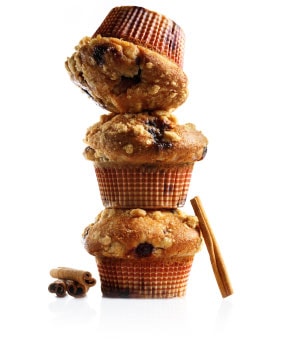
Written By: Gloria Tsang, RD
Title: Founding Registered Dietitian
Alumni: University of British Columbia
Last Updated on:

A recent report sparked a renewed public interest in aluminum in our foods. Released by Hong Kong’s Centre for Food Safety in May 2009, researchers found surprisingly high levels of aluminum in certain foods – particularly in bakery products like muffins, cakes, and tarts, as well as in steamed buns, pancakes, and waffles.

Table of Contents
Aluminum is usually found in food additives used in commercial food production. For instance:
Aluminum has been found to adversely affect the reproductive and nervous systems in animal studies. Some human studies have also suggested a potential association between aluminum and Alzheimer’s Disease. Although the health effects of aluminum on humans are not definitive, the Joint Food and Agriculture Organization/World Health Organization Expert Committee on Food Additives (JECFA) significantly lowered the tolerable intake in 2006 – from 7 mg/kg body weight to 1 mg/kg body weight per week. That means no more than 63 mg of aluminum per week for a 140-pound adult, and 27 mg per week for a 60-pound child. The Hong Kong report found that the average commercial muffin alone contains 28 mg of aluminum! What’s more shocking is that they also found aluminum in soy-based infant formula!
Okay, but that’s half way around the globe. What about us? Well, in the United States, aluminum-containing food additives are designated by the FDA as “generally recognized as safe” (GRAS). Several petitions were launched to rescind the GRAS status in early 2000s, but nothing seems to have resulted. In Canada, the Bureau of Chemical Safety branch of Health Canada’s Food Directorate initiated a review of aluminum in foods in 2008, but results are not yet available.
Eating a muffin every morning, whether it contains aluminum or not, is not a healthy way to start your day. So, eat a balanced diet with a variety of foods to minimize your exposure to aluminum. If you are an avid baker, choose baking powder that is aluminum-free. Aluminum-free baking powder usually displays this claim prominently on the front package. If you’re unsure, check the ingredient list and avoid those that contain sodium aluminum sulfate. Better yet, make your own homemade baking powder with 2 parts baking soda, 1 part cream of tartar and 1 part cornstarch, according to chef David Lebovitz.
What about aluminum cookware? Is it safe? Apparently, 1 to 2 mg of aluminum are contributed to foods cooked in aluminum cooking pots and pans. Leafy vegetables and acidic foods, like tomatoes and citrus, are most likely to absorb aluminum. Choose anodized aluminum cookware if possible, as anodization reduces the leaching of aluminum from cookware into foods.
Alumni: University of British Columbia – Gloria Tsang is the author of 6 books and the founder of HealthCastle.com, the largest online nutrition network run by registered dietitians. Her work has appeared in major national publications, and she is a regularly featured nutrition expert for media outlets across the country. The Huffington Post named her one of its Top 20 Nutrition Experts on Twitter. Gloria’s articles have appeared on various media such as Reuters, NBC & ABC affiliates, The Chicago Sun-Times, Reader’s Digest Canada, iVillage and USA Today.
Pregnancy and Travel: What To Pack To Bring Along
Potassium Recommendation for People with High Blood Pressure